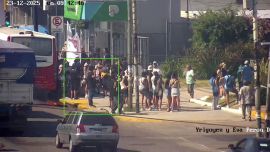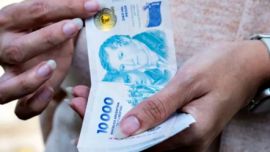Violence surged again in Mexico, with the resort city of Acapulco hit particularly hard. Brazilian police lost control of more of Rio de Janeiro’s slums to gangs. A fire at an overcrowded children’s home killed 40 girls in Guatemala, while domestic violence left scars on survivors across Argentina, who once again declared “Ni Una Menos.”
Argentina in fact drew the attention on a number of occasions, with high-level political visits and summits – but it only drew a host of global celebrities once, when football superstar and national team captain Lionel Messi tied the knot with his childhood sweetheart in his native Rosario.
In politics, there was plenty of presidential action, but the ongoing crisis in Venezuela – which left hundreds dead – was the main topic on the regional agenda. The energy-rich nation, which drives most of its revenues from oil, remained locked in a depression of hyperinflation and food and medicines hortages, as opposition protesters took to the streets repeatedly and politicians clashed (left).
In neighbouring Brazil, most of the anger was focused on President Michel Temer, whose unpopular government and allies in Congress helped him to escape facing trial on corruption charges. Former president Luiz Inácio Lula da Silva was also in the press as he appealed a decade-long prison sentence on similar charges.
In Chile, politics was more peaceful although a handover is imminent after former president Sebastián Piñera won this month’s presidential runoff vote. Lenín Moreno assumed the presidency in Ecuador too, although his actions have prompted a split with former president Rafael Correa.
Elections also caused problems in Honduras, where a disputed vote count has the opposition demanding that President Juan Orlando Hernández’s re-election be annulled amid claims of fraud.
Finally, Peru saved its own political turmoil for last. President Pablo Kuczynski, who was questioned by police for four hours this week, survived attempts to impeach him over alleged corruption.
But he angered many inside the country with his controversial decision to pardon former president Alberto Fujimori, who had been serving a 25-year sentence for human rights abuses, including several murders by death squads, as well as corruption during his brutal 1990-2000 rule (below).
Kuczynski, Lula and Temer were all placed in the spotlight due to revelations that emerged through the Operation Lava Jato (“Car Wash”) probe in Brazil, investigating corruption related to the disgraced Brazilian construction giant Odebrect.
Ecuador’s Vice-President Jorge Glas became the highest-level politician yet to be convicted, he was sentenced to six years in prison for taking Odebrecht kickbacks. Another Latin American vice-president also left his post – Uruguay’s Raúl Sendic resigned under pressure.
In Bolivia, a defiant Evo Morales looks set to go for a fourth term, despite having lost last year’s referendum on whether he should stand.




















Comments